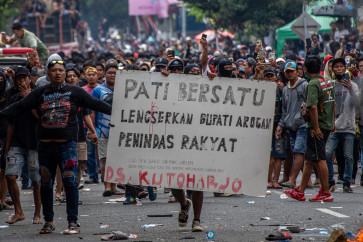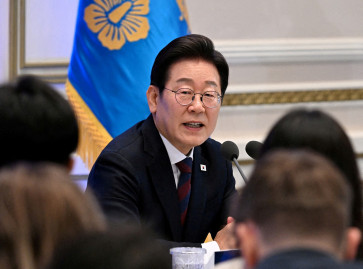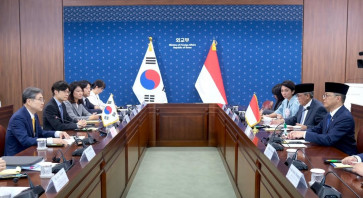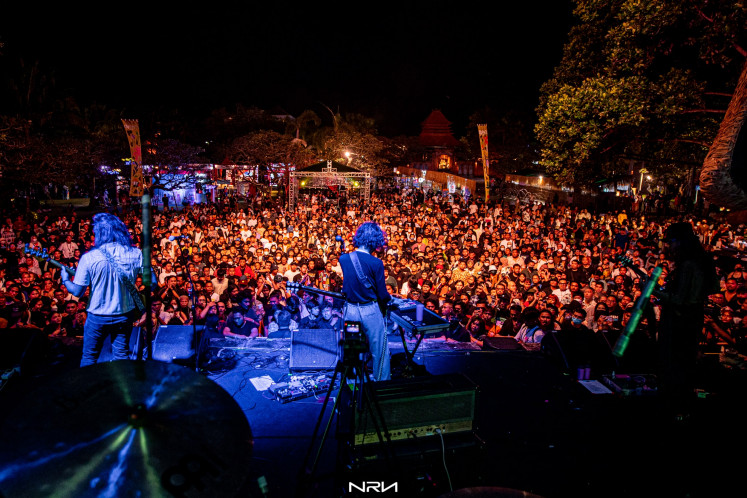Popular Reads
Top Results
Can't find what you're looking for?
View all search resultsPopular Reads
Top Results
Can't find what you're looking for?
View all search resultsIndonesia from Sabang to Merauke: 'Sine qua non'
Another appalling incident of intolerance has occurred â this time in Singkil, Aceh â following a fatal clash in Tolikara, Papua
Change text size
Gift Premium Articles
to Anyone
A
nother appalling incident of intolerance has occurred ' this time in Singkil, Aceh ' following a fatal clash in Tolikara, Papua. We may not realize it at first, but these two incidents are distinctively symbolic.
First and foremost, the two bring to mind a song that Indonesian children learn to sing in early childhood education, 'Dari Sabang Sampai Merauke' (From Sabang to Merauke). Through this song, Indonesian children learn that Indonesia spans from Aceh to Papua.
Therefore, the incidents of intolerance in Tolikara and Singkil set a proxy for the depiction of Indonesia, unfortunately in a disparaging sense.
In addition, both incidents depict the same situation: a minority in the presence of a majority. In Tolikara, it is Muslims in the presence of Christians; while in Singkil, it is Christians in the presence of Muslims.
Set aside politicizing or conspiratorial thoughts, these two incidents show that Bhinneka Tunggal Ika (Unity in Diversity), our national motto, is on the verge of losing its grip. In the past, our founding fathers decisively regarded diversity as a reality. They did not see our diversity as a liability. Instead, they considered it an asset 'real and valuable.
Bhinneka Tunggal Ika was set out as our national motto as our founding fathers did not envision the unity in diversity. Rather, they celebrated the diversity that made up the nation. Just as Benedict Anderson (1983) infamously put forward that we live the image of communion with others despite the unknown of most of others, our founding fathers believed the imagined Indonesia came from the reality of its known rich diversity.
Bhinneka Tunggal Ika was distinguishably chosen by our founding fathers to represent who we are as we gained independence in 1945. As seen through the lens of the peace psychology perspective, our independence has not only liberated us from the colonizers but also marked the transition from peacemaking to peace building.
We were in the peacemaking process when we fought our enemies to be decolonized. We began our peace building process once we declared our independence.
Yet, peace building is complex. Fortunately, the genius of our founding fathers has given us clear direction on what to do. Popularly said, it is to mengisi kemerdekaan (fill the independence). Substantially, it is to manage diversity so as to being constructively transformed into capital for achieving social justice ' for all people of Indonesia.
Aiming for social justice is working toward the elimination of structural violence, as asserted by Daniel Christie (1997).
Structural violence occurs when economic and political structures systematically deprive the satisfaction of people's needs.
Christie, former president of the Division of Peace Psychology of the American Psychological Association, put forward the human needs theory as he pointed out that people and social groups in a society are organisms. Moreover, there are basic needs built into organisms: need for security, identity, wellbeing and self-determination.
These needs are universal to all human beings across time and space. These needs are critical in the sense that human beings, regardless of race, ethnicity, gender and religion, strive to fulfill them.
In effect, people may feel frustrated when they are deprived of their needs. Therefore, the fulfillment of these needs becomes the sine qua non ' an essential condition ' for a society, social organization to function in harmony.
What occurred in Tolikara and Singkil showed not only that diversity was not being celebrated but was not being managed in a way that people's need for identity was being properly fulfilled. The acts or rites to express ones devotion to religion are embedded in people's identity and identification with their religion.
As it is a need, people constantly pursue it despite their environment constantly changing. In the Indonesian context, people should be able to satisfy their religion-related identity. We not only have Bhinneka Tunggal Ika but we also have officially recognized religions, which include Islam and Christianity.
Supposedly, people can sustainably fulfill their need for religion-related identity by benefiting from, at the very least, the establishment of the Religious Affairs Ministry and umbrella organizations such as the Indonesian Ulema Council (MUI), Indonesian Communion of Churches (PGI), Indonesian Bishops Conference (KWI), Indonesian Central Council for Dharma Hinduism (PHDI), Indonesian Buddhist Community (Walubi) and Indonesian High Council of Confucianism (Matakin).
Moreover, what happened in Tolikara and Singkil show that people's need for security, especially those who fell victim and were persecuted, were dissatisfied.
The incidents of intolerance in Tolikara and Singkil show nothing but the state's failure to cater people's needs amid the reality of diversity that has been acclaimed and in existence since the very beginning of this nation.
To avoid the incidents in Tolikara and Singkil from occurring again anywhere in the country in the future is, of course, not easy.
There is one general principle derived from the human needs theory that is worth to consider. That is 'prevention' (not prevention) ' to carry away the causes of an unwanted event by producing conditions that do not give rise to its causes. Where there's a will, there's a way.
_______________________
The writer, a lecturer of peace psychology at the School of Psychology, University of Indonesia, is pursuing a doctorate at Victoria University, Melbourne, Australia.










